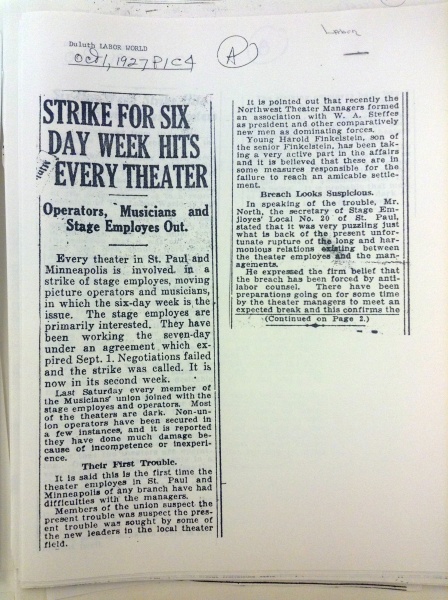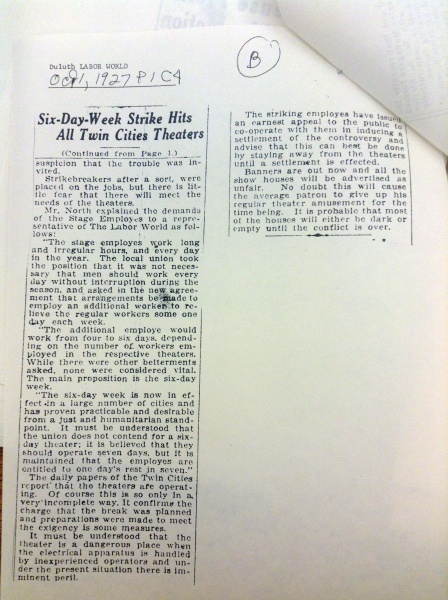| Artifact Type | Labor Newspapers, Sources |
| Publication | Duluth Labor World |
| Page Number | 1–2 |
| Place | Duluth, MN |
| Publication Date | October 1, 1927 |
| Transcript | Show/Hide |
|
Headline: “Strike for Six Day Week Hits Every Theater” Subhead: Operators, Musicians and Stage Employes Out. Every theater in St. Paul and Minneapolis is involved in a strike of stage employes, moving picture operators and musicians, in which the six-day week is the issue. The stage employes are primarily interested. They have been working the seven-day under an agreement which expired Sept. 1. Negotiations failed and the strike was called. It is now in its second week. Last Saturday every member of the Musicians’ union joined with the stage employes and operators. Most of the theaters are dark. Non-union operators have been secured in a few instances, and it is reported they have done much damage because of incompetence or inexperience. Their First Trouble.It is said this is the first time the theater employes in St. Paul and Minneapolis of any branch have had difficulties with the managers. Members of the union suspect the present trouble was sought by some of the new leaders in the local theater field. It is pointed out that recently the Northwest Theater Managers formed an association with W. A. Steffes as president and other comparatively new men as dominating forces. Young Harold Finkelstein, son of the senior Finkelstein, has been taking a very active part in the affairs and it is believed that these are in some measures responsible for the failure to reach an amicable settlement. Breach Looks Suspicious.In speaking of the trouble, Mr. North, the secretary of Stage Employes’ Local No. 20 of St. Paul, stated that it was very puzzling just what is back of the present unfortunate rupture of the long and harmonious relations existing between the theater employes and the managements. He expressed the firm belief that the breach has been forced by anti-labor counsel. There have been preparations going on for some time by the theater managers to meet an expected break and this confirms the suspicion that the trouble was invited. Strikebreakers after a sort, were placed on the jobs, but there is little fear that there [sic] will meet the needs of the theaters. Mr. North explained the demands of the Stage Employes to a representative of The Labor World as follows: “The stage employes work long and irregular hours, and every day in the year. The local union took the position that it was not necessary that men should work every day without interruption during the season, and asked in the new agreement that arrangements be made to employ an additional worker to relieve the regular workers some one day each week. “The additional employe would work from four to six days, depending on the number of workers employed in the respective theaters. While there were other betterments asked, none were considered vital. The main proposition is the six-day week. “The six-day week is now in effect in a large number of cities and has proven practicable and desirable from a just and humanitarian standpoint. It must be understood that the union does not content for a six-day theater; it is believed that they should operate seven days, but it is maintained that the employes are entitled to one day’s rest in seven.” The daily papers of the Twin Cities report that the theaters are operating. Of course this is so only in a very incomplete way. It confirms the charge that the break was planned and preparations were made to meet the exigency is [sic] some measures. It must be understood that the theater is a dangerous place when the electrical apparatus is handled by inexperienced operators and under the present situation there is imminent peril. The striking employes have issued an earnest appeal to the public to co-operate with them in inducing a settlement of the controversy and advice that this can best be done by staying away from the theaters until a settlement is effected. Banners are out now and all the show houses will be advertised as unfair. No doubt this will cause the average patron to give up his regular theater amusement for the time being. It is probably that most of the houses with either be dark or empty until the conflict is over. |
|
| Archive | Minnesota Historical Society |
| Citation | “Strike for Six Day Week Hits Every Theater,” Duluth Labor World, October 1, 1927. |
| Location | MinneapolisMinnesotaSaint Paul |
| Tags | 1920s1927October 1927 |

